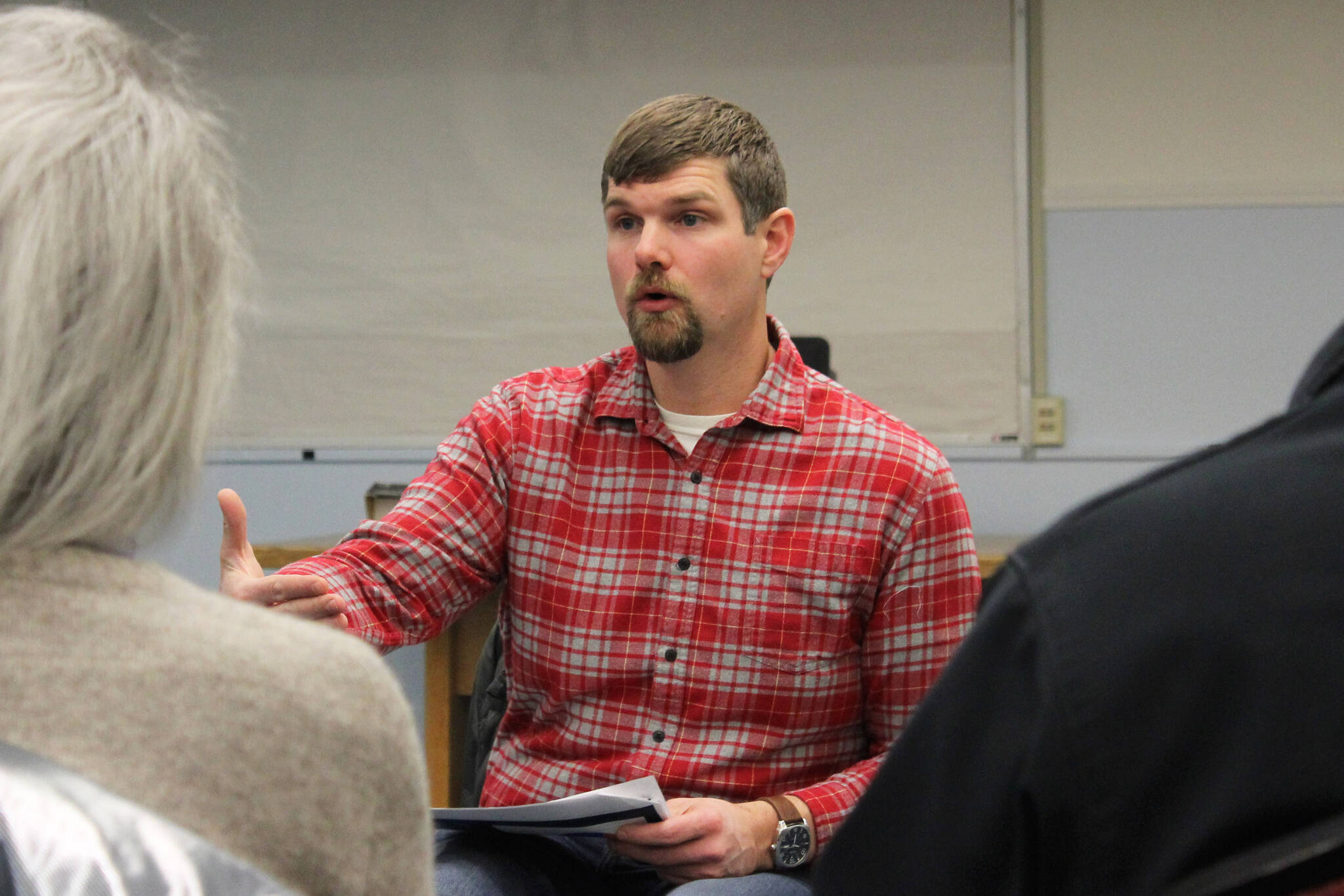On a dark and blustery Monday night in Nikiski this week, State Sen. Jesse Bjorkman gathered with constituents in the Nikiski Community Recreation Center for one of multiple town hall events he’s holding before heading back to Juneau for the upcoming legislative session.
For about two hours, Bjorkman spoke with an intimate group of five attendees that included Peter Ribbens, Nikiski’s representative on the Kenai Peninsula Borough Assembly, and Wayne Ogle, a former assembly member who currently serves on Homer Electric Association’s board of directors.
A large portion of the discussion during Monday’s town hall focused on the pending shortage of natural gas resources in Cook Inlet. The Alaska Department of Natural Resources first reported in January 2023 that demand for Cook Inlet gas could outpace supply by 2027 without new development in active fields.
Hilcorp Alaska LLC, which is responsible for about 85% of gas production in Cook Inlet, said last year that it does not have enough gas reserves to enter into new utility contracts, prompting further concerns about a shortage.
HEA and ENSTAR Natural Gas Company LLC announced in April that they had signed a new agreement that will supply the cooperative with gas for the foreseeable future.
Bjorkman said Hilcorp’s monopoly-like control over production in the region, though, could mean utility customers’ monthly bills go up. The heads of Alaska Railbelt utilities told a Senate Resources Committee in February that they’ve also explored importing natural gas, which could be cheaper than paying for gas produced in Cook Inlet.
As the state looks for ways to address the shortage, Bjorkman said he is reluctant to “gambl(e)” with state money.
“If I can buy gas off a ship that’s $12 … instead of paying $15 for something that comes out of a well in the Inlet, I will buy the $12 gas,” Bjorkman said.
Among his other priorities for the upcoming session are his fishing permit buyback bill, funding for Alaska’s K-12 schools and food security.
Shortly after being elected last fall, Bjorkman picked up where Micciche left off with a bill that would establish a voluntary permit buy-back program for Cook Inlet’s east side setnet fishery. That bill, currently before lawmakers as S.B. 82, aims to reduce tensions between that fishery and other user groups by reducing the amount of fishing gear in the water.
The program would run like a lottery and only be offered if a majority of permit holders agree to hold one. A fishing permit successfully retired through the lottery program would be bought out with financial contributions from nongovernmental organizations. The fishing grounds associated with the permit would be closed to fishing once the permit was bought out.
“It’s not a perfect solution,” he said. “In fish politics, I don’t think there are any perfect solutions. But it’s an idea.”
Consideration of that legislation will come after Cook Inlet’s east side setnet fishery was completely closed for the 2023 season. The unprecedented pre-season closure was issued by the Alaska Department of Fish and Game in an attempt to conserve more chinook salmon.
Another issue Bjorkman said he knows will receive a lot of attention in Juneau during the upcoming session is funding for Alaska’s K-12 schools. School districts around the state lobbied lawmakers last session for an increase to the amount of money the state gives districts per student, also called the base student allocation.
The Legislature ultimately failed to change the allocation amount, but rather approved $175 million in one-time bonus funding for districts. Gov. Mike Dunleavy then vetoed half the amount. The Kenai Peninsula Borough School District used the one-time funding to bring back staff positions and other cuts it had made in order to balance its budget for the current fiscal year.
Bjorkman, who teaches social studies at Nikiski Middle/High School when not in Juneau, has been a vocal proponent of increasing and inflation-proofing the amount of money that Alaska spends on K-12 schools.
“Schools across the state aren’t able to meet their mission and provide outcomes nearly as good as they were 10 years ago because of dwindling resources,” he said during Monday’s town hall.
Bjorkman also teased food security as being the subject of a bill he plans to sponsor next session.
The legislation, among other things, would allow buildings used by farmers for food production to be taxed at a lower, farm-specific rate set by municipalities. The idea for the bill, he said, comes from farmers and a recommendation by Alaska’s Food Strategy Task Force — a group to which he was recently appointed.
The first day of the upcoming legislative session is Tuesday, Jan. 16, 2024. More information about the Alaska Legislature can be found at akleg.gov. Bjorkman will hold another town hall event from 6-8 p.m. on Thursday, Dec. 7, 2023, in the Betty J. Glick Assembly Chambers in Soldotna.
Reach reporter Ashlyn O’Hara at ashlyn.ohara@peninsulaclarion.com.

